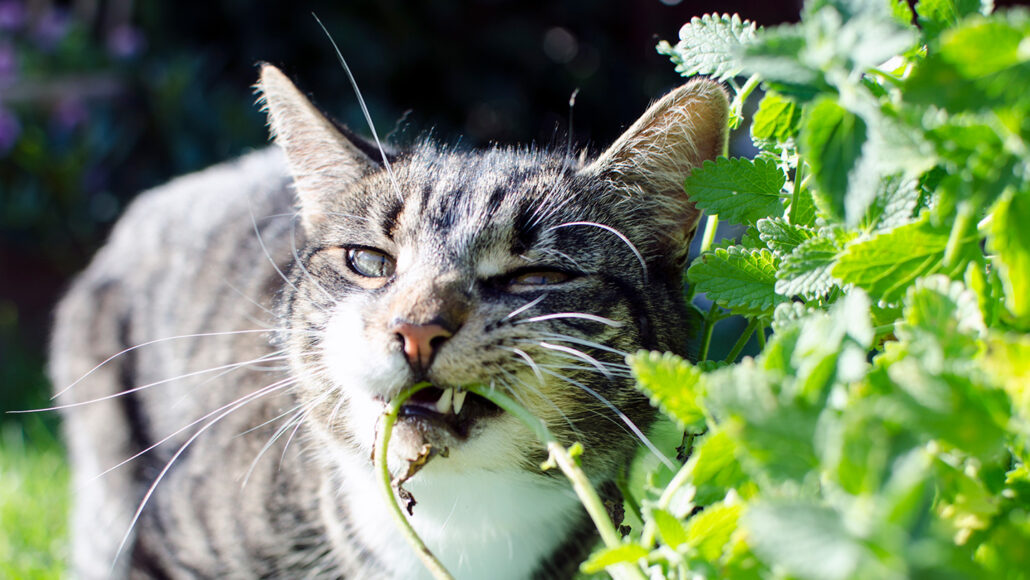Catnip stimulates cats’ olfactory senses and can induce various behaviors, including playfulness, relaxation, and even mild hallucinations. Cats have a natural affinity for catnip, a plant from the mint family that contains a chemical called nepetalactone.
When cats come into contact with catnip, it activates their olfactory receptors, leading to a range of responses. Some cats may become more energetic, engaging in vigorous play, while others may become calm and sedated. In certain cases, cats may even exhibit strange and amusing behaviors like rolling, rubbing their bodies, or vocalizing.
The effects typically last for around 10 minutes before wearing off, and it is important to note that not all cats are affected by catnip, as its response is influenced by their genetic makeup. This article explores the fascinating reactions that catnip elicits, shedding light on this unique response observed in our feline friends.

Credit: www.science.org
The Science Behind Catnip’S Effect On Cats
Catnip has a fascinating effect on cats, and understanding the science behind it can shed light on this phenomenon. The key compound present in catnip is nepetalactone, which interacts with a cat’s brain in intriguing ways. Research suggests that when cats are exposed to catnip, Nepetalactone binds to specific receptors in their nasal tissue.
This triggers a response that can lead to behaviors like rubbing, rolling, purring, and even increased playfulness. The compound acts as a stimulant for cats, creating a sense of excitement and euphoria. It’s important to note that not all cats respond to catnip in the same way.
Around 50-75% of cats are affected by catnip, while others may not show any response at all. The unique reaction that cats have to catnip makes it a fascinating subject to further explore in the future.
The Fascinating Reactions Of Cats To Catnip
The fascinating reactions of cats to catnip are an instant sight to behold. When a cat encounters catnip, an immediate response occurs. Their behaviors become mysterious and intriguing. Catnip has the curious ability to induce playful effects in cats, leading them to engage in hunting, rolling, and jumping activities.
It’s incredible how this herb can instantly ignite a burst of energy and curiosity in our feline friends. The playful effects of catnip are both entertaining and amusing to witness. Understanding the impact of catnip on cats unravels a world of unique behaviors and provides insight into our pets’ natural instincts.
Whether it’s the way they stalk, pounce, or simply enjoy a moment of sheer bliss, catnip undoubtedly adds an element of excitement to their lives.
Health Benefits And Risks Of Catnip For Cats
Catnip, a fragrant herb, is known to have various effects on cats’ health and behavior. It acts as a natural stress reliever by calming them and reducing anxiety. Additionally, catnip can also help with other stress-related issues such as depression and restlessness.
However, it’s important to note that catnip affects cats differently, and some may not exhibit any reaction to it at all. As for potential side effects, too much catnip consumption can lead to vomiting and diarrhea. It is therefore crucial to administer catnip in moderation, ensuring that your feline friend doesn’t ingest excessive amounts.
It is advisable to consult with a veterinarian before introducing catnip to your cat’s routine, especially if they have any underlying health conditions. Overall, catnip can provide benefits for your cat’s mental well-being, but it should be used responsibly to avoid any adverse reactions.
Frequently Asked Questions For What Does Catnip Do To Cats
What Is Catnip And What Does It Do To Cats?
Catnip is a herb from the mint family that contains nepetalactone, a compound that affects cats. When cats smell or consume catnip, it triggers a response in their brain, making them feel playful, happy, and sometimes even a little hyperactive.
Not all cats respond to catnip, though; it is estimated that around 50-75% of cats are affected by it.
How Does Catnip Affect Cats?
When cats are exposed to catnip, they may exhibit various behaviors such as rolling, rubbing, purring, and jumping. It stimulates their senses and induces a feeling of euphoria in some cats. The exact reason why cats love catnip is still unknown, but it is believed that the nepetalactone in catnip mimics pheromones and stimulates their natural instincts.
Is Catnip Safe For Cats?
Yes, catnip is generally safe for cats and non-addictive. Cats usually regulate their intake, so there’s no need to worry about them overdosing on catnip. However, excessive exposure to catnip may cause mild stomach upset or diarrhea in some cats.
It’s always a good idea to observe your cat’s behavior while introducing catnip for the first time.
Can Cats Become Immune To Catnip?
Cats cannot become immune to catnip; however, they may develop a temporary tolerance to its effects. If a cat is exposed to catnip excessively or too frequently, it may become desensitized to the herb and show reduced response. To prevent this, it’s recommended to limit catnip exposure to occasional play sessions.
Conclusion
To sum up, catnip can have a variety of effects on cats. It is a natural herb that can provide stimulation, relaxation, and even euphoria for our feline friends. The active ingredient, nepetalactone, can be sniffed, licked, or chewed by cats, leading to a range of reactions such as rolling, playing, purring, or zoning out.
It is important to note that not all cats are affected by catnip, as its effects are influenced by genetics. Understanding the potential effects of catnip can be useful for cat owners, as it can be used as a tool for enrichment, training, or even stress relief.
However, it’s crucial to ensure that catnip is used in moderation, as excessive exposure may dull its effects. Ultimately, it’s recommended to consult with a veterinarian before introducing catnip to your furry friend’s life. With proper usage, catnip can provide endless entertainment and joy for cats while maintaining their well-being.



